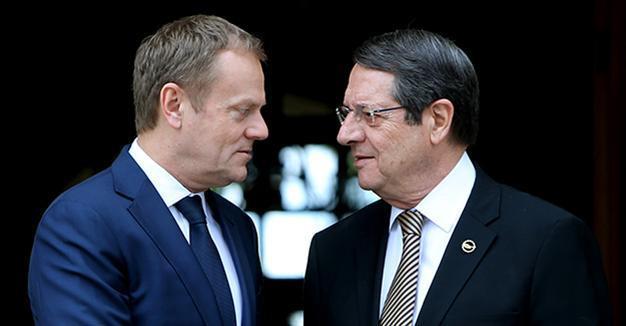Greek Cypriots threaten to block EU-Turkey deal
NICOSIA

European Council President Donald Tusk, left, talks with Cyprus President Nicos Anastasiades at the Presidential Palace before their meeting in the ethnically divided island's capital Nicosia on Tuesday, March 15, 2016. AP Photo
Greek Cyprus threatened on March 15 to derail a proposed EU deal with Turkey to curb the flow of migrants to Europe, insisting on longstanding demands including that Ankara recognize its government.EU President Donald Tusk, meanwhile, said the deal needed to be rebalanced to be accepted by all 28 member states and EU institutions.
“Cyprus does not intend to consent to the opening of any new chapters if Turkey does not fulfil its obligations,” Greek Cypriot President Nikos Anastasiades was quoted as saying by AFP on March 15 after talks with Tusk in Nicosia.
EU and Turkish leaders agreed last week to a tentative proposal including the return of migrants landing in Greece and a “one-for-one” swap of Syrian refugees.
Anastasiades said Greek Cyprus would not accept “Turkish demands without [the] implementation of Turkey’s long-pending obligations” in its EU membership bid.
Turkey expects the accord to lead to the opening of new chapters in Ankara’s longstanding EU membership bid and to ease visa requirements in Europe’s passport-free Schengen area.
Tusk, who headed to Ankara after meeting Anastasiades and was scheduled to hold talks with Turkish Prime Minister Ahmet Davutoğlu ahead of negotiations on the EU-Turkey proposal, admitted “we are not there yet” in terms of a deal.
“The Turkish proposal... still needs to be rebalanced so as to be accepted by all 28 member states and the EU institutions,” he told reporters.
The plan to expel migrants en masse from Greece has sparked international criticism, with the U.N.’s top officials on refugees and human rights questioning whether it would be legal.
Officials have also expressed concern over the potential need for compromise with Ankara, as fears grow over freedom of expression and rights abuses.
“One of the issues to be sorted out is the key question of legality,” Tusk said.
A Cypriot refusal of the migrant-swap deal would effectively block the largest diplomatic push yet to ease Europe’s burden of accommodating hundreds of thousands of refugees, many of whom enter the EU through Turkey.
The island of Cyprus has been divided since 1974 when Turkish troops intervened in its north in response to an Athens-engineered coup attempt.
Turkey does not recognize the government of Greek Cyprus and Nicosia has blocked six key chapters of Ankara’s negotiations for EU membership since 2009, effectively halting the process.
Cyprus insists Turkey must first meet its longstanding demands for recognition, and to open up trade ties, ports and airports.
The Greek and Turkish Cypriot administrations are conducting U.N.-backed peace talks aimed at reuniting the island.
At one point last week in Brussels, Anastasiades was involved in a heated confrontation with five key European figures, including German Chancellor Angela Merkel, in which he came under heavy pressure to back the accord, European sources told AFP.
Germany registered a record influx of asylum seekers that reached 1.1 million in 2015.
Tusk’s visit to Cyprus was arranged at the last minute – a sign of Brussel’s realization that a new approach is needed.
“I am not here to exert pressure on Cyprus,” the EU president told reporters. “I am here to listen to your position.”
















